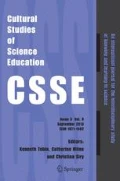Abstract
This forum article is a response to the article by Alandeom W. Oliveira, Patterson Rogers, Cassie F. Quigley, Denis Sambursky, Kimberly Barss, and Seema Rivera, The article explores agency from the perspective of both personal action and an understanding of causality within environmental systems, and it explores environmental read-alouds as pedagogical events to enhance elementary school students’ climate literacy and activism. In my response I attempt to sharpen the idea of agency through the literatures on (1) prevention education and (2) the dynamics of classroom task systems.
Similar content being viewed by others
References
Cuijpers, P. (2002). Effective ingredients of school-based drug prevention programs: A systematic review. Addictive Behaviors, 27, 1009–1023. doi:10.1016/S0306-4603(02)00295-2.
Doyle, W. (1983). Academic work. Review of Educational Research, 53, 159–199. doi:10.3102/00346543053002159.
Doyle, W. (1988). Work in mathematics classes: The context of students’ thinking during instruction. Educational Psychologist, 23, 167–180. doi:10.1207/s15326985ep2302_6.
Doyle, W. (2006). Ecological approaches to classroom management. In C. Evertson & C. Weinstein (Eds.), Handbook of classroom management: Research, practice and contemporary issues (pp. 97–125). New York: Lawrence Erlbaum Associates, Inc. PMid:16488341.
Gottfredson, D. C., & Gottfredson, G. D. (2002). Quality of school-based prevention programs: Results from a national survey. Journal of Research in Crime and Delinquency, 39, 3–35. doi:10.1177/002242780203900101.
Lampert, M., Boerst, T., & Graziani, F. (2011). Organizational resources in the service of school-wide ambitious teaching practice. Teachers College Record, 113, 1361–1400.
Marx, R. W., & Harris, C. J. (2006). No child left behind and science education: Opportunities, challenges, and risks. Elementary School Journal, 106, 467–478. doi:10.1086/505441.
Turner, E. E., Varley Gutiérrez, M., Simic-Muller, K., & Díez-Palomar, J. (2009). “Everything is math in the whole world”: Integrating critical and community knowledge in authentic mathematical investigations with elementary Latina/o students. Mathematical Thinking and Learning, 11, 136–157. doi:10.1080/10986060903013382.
Weinstein, N. D. (1989). Optimistic biases about personal risks. Science, 246(4935), 1232. doi:10.1126/science.2686031.
Willis, L. E. (2009). Evidence and ideology in assessing the effectiveness of financial literacy education. San Diego Law Review, 46, 415–458. Retrieved April 2013 from http://ssrn.com/abstract=1098270.
Wilson, S. J., & Lipsey, M. W. (2007). School-based interventions for aggressive and disruptive behavior: Update of a meta-analysis. American Journal of Preventive Medicine, 33(Suppl. 2S), 130–143. doi:10.1016/j.amepre.2007.04.011.
Author information
Authors and Affiliations
Corresponding author
Additional information
Lead Editor: S. L. Ramos de Robles.
Forum response to A. W. Oliveira, P. Rogers, C. F. Quigley, D. Samburskiy, K. Barss, and S. Rivera, Environmental agency in read alouds. doi:10.1007/s11422-013-9531-6
Rights and permissions
About this article
Cite this article
Doyle, W. The many faces of agency. Cult Stud of Sci Educ 10, 275–279 (2015). https://doi.org/10.1007/s11422-014-9610-3
Received:
Accepted:
Published:
Issue Date:
DOI: https://doi.org/10.1007/s11422-014-9610-3




